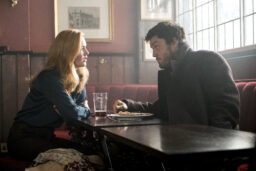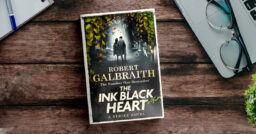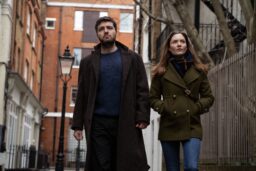How does where you’re born influence who you are?
‘Where you’re born does influence who you are, though,’ said Robin. ‘‘Cultural norms and language have an effect.’
Robert Galbraith. Troubled Blood
How does the place you are born shape your life? What early lessons about the world do you absorb there? Who might you have become if you were born somewhere else? What if you were surrounded by open fields, the drama of a wind swept coast, or the buzz and hum of the city? What does the place a person choses to live as an adult tell you about their youth – which lessons have stuck, and which have been rejected?
At first glance Robin Ellacott’s childhood seems very different to the life Cormoran lived with his unconventional mother, Leda. Robin had a happy childhood in a stable family and material comfort; Strike spent much of his youth dragged through luxury and squalor as Leda chased a variety of men, music and enthusiasms. As is often the case with Robin and Cormoran though, surface differences mask deep affinities which become clearer in the noise and anonymity of London and as their work brings them again and again to its darkest corners.
However unsettled his childhood was, Cormoran still has roots. Dave Polworth, one of his oldest friends, isn’t wrong when he claims Cormoran as a Cornish man born and bred. Strike’s vowels mark him out a west country native and he can launch into a rousing rendition of The Song of the Western Men when he feels the need. This sense of coming from somewhere is thanks to his aunt and uncle, Ted and Joan Nancarrow, who provided a refuge for Strike and his sister Lucy whenever it was needed, and their house in the little fishing village of St Mawes, smelling of flowers and baking, is the nearest thing to a home Cormoran has ever known. It was in St Mawes Cormoran met Dave, who became friend and champion of the unusually large boy with the funny accent in primary school. Cormoran also met Ilsa in St Mawes. She now lives in London, married to another of Strike’s oldest friends and provides him with a refuge too, offering him their spare room when the attentions of the press make life impossible in Denmark Street.
‘However unsettled his childhood was, Cormoran still has roots.’
So, thanks to Ted and Joan in their spotless old fashioned home, Cornwall has become Cormoran’s touchstone and his reference point. When he notices the flash of beauty during a London dawn, he thinks of the colours of the sea off the Cornish coast. The rain against the windows in Denmark Street makes him think of how it had lashed like whips against the glass in St Mawes. A busy Sunday afternoon in Hammersmith makes him remember the emptiness of the Sunday High Street in St Mawes which drove him and Lucy down to the beach. He knows, even when he isn’t there, just how Christmas will unfold in Ted and Joan’s house, and the pub of whitewashed Cornish stone, The Victory, is still his local. In the London pubs he frequents, The Tottenham near his office, or The Feathers when he’s meeting his contacts from Scotland Yard, he orders Doom Bar, the Cornish Amber ale.
However strong his connections and loyalties are though, Strike shows no sign of wanting to return to Cornwall permanently. He feels guilty when he doesn’t visit, but life in a small community brings pressures he doesn’t like. The people of St Mawes know his family and his business, and somewhere between the squats, the parties and flats Leda dragged him to, Cormoran has developed an almost pathological need for privacy. In St Mawes every time he leaves the house he is in danger of being stopped and asked questions he is tired of answering, and the concern and curiosity of his female relatives grate on him indoors. London, even if he sometimes has trouble keeping a low profile there too, thanks to his growing fame, gives him the chance to think, undisturbed by the well-meaning interruptions of others. He might not think as his mother did, that hell would be an eternal Sunday in St Mawes, but the village, crowded with tourists through the summer months, doesn’t seem to be his idea of heaven either.
Unlike Strike, always swept from place to place by his mother’s changes of partner and residence, Robin has had a stable middle-class upbringing. Her parents have been together for decades and her happy childhood was safe and secure, it even included a pony. She comes from a solid family, bound to the land of an ancient Yorkshire town, with a 9th century cross in its churchyard and a square still crowded with stalls and animals on market days just as it has been for centuries. It should have been a solid foundation on which to build a life, but the trauma which led to her dropping out of university had left her standing on shaky ground.
‘Matthew and Robin seem to have fallen for different versions of London.’
Masham is a reference point for Robin though, just as St Mawes is for Strike. Being brought up among the dales of Yorkshire means the subtropical greenness of Cornwall seems extraordinary, and however much she loves London she can still pine for trees, moors and hills. She reckons the tea from Betty’s in Harrogate is better than anything she can get in the capital and orders mushy peas, ‘Yorkshire caviar’, with her fish and chips. Like Cormoran, Robin carries Yorkshire in her voice as well as her mind’s eye, though she can dial her accent up or down when she wants to, and it comes out most strongly when she swears. Her childhood travels with her in her battered old Land Rover as well, it still smells of old dog and Wellington boots, and as Strike observes, it seems like the sort of car you’d take to the gymkhana.
Robin didn’t exactly choose to come to London, she has done so to be with Matthew, who also grew up in Masham. When she arrives the capital seems vast, complex and impenetrable, but working with Cormoran teaches her to love the city and feel increasingly at home there. Matthew and Robin seem to have fallen for different versions of London though. Matthew is transfixed by its surface glitter – unlike Robin, he doesn’t have any trace of Yorkshire in his voice, and Robin’s brothers always reckoned he was a wannabe southerner – but the London Robin discovers is darker, full of characters and twists which fascinate her, but which Matthew finds disturbing and distasteful.
Matthew, and Cormoran’s sister Lucy, might have shared Robin and Strikes’ upbringings, but they have taken different lessons away with them. Lucy has escaped the chaos of her upbringing by creating a life as conventional and safe as Cormoran’s is precarious and complex. Joan is her ‘real’ mother, she doesn’t want to talk about Leda. Lucy and her three children go back regularly to St Mawes for their holidays, then return to their sensible London life with the magnolia tree in the front garden to worry about Strike, his business and his love life and try and persuade him to adopt a more conventional lifestyle. Matthew is worried by Robin’s fascination with her work, seeing her interest as a cause for concern rather than celebration, as something unhealthy rather than healing.
‘Working with Strike in the anonymity of London allows Robin to choose a different history and a different personality with every case they work and that, strangely, is allowing her to become more and more herself.’
Robin feels the pressures of small town life in Masham as much as Cormoran does in St Mawes. When at home in Yorkshire she is always on display, and being alone in her childhood bedroom reminds her continually of the darkest period of her life. Perhaps her delight in going undercover comes partly from being, in her home town, always known as Matthew’s partner, the daughter of Linda and Michael, and sister of Martin, Stephen and Jonathan. Working with Strike in the anonymity of London allows her to choose a different history and a different personality with every case they work and that, strangely, is allowing her to become more and more herself. Even her family notice she’s got better at standing up for herself. Working with Strike in London, Robin begins to understand her family’s need to keep her safe has stifled her own ambitions and curiosity, and now, instead of celebrating her enthusiasm for her work with Cormoran, they look at her sideways, waiting for her to fall apart.
Robin remembers she’s always felt the pull of a mystery, like wondering about the strange stone crab on the church wall in Masham, and realises the impulse set her apart even before she left university. Her family and Matthew might see her work as an unhealthy interest growing out of a period of trauma, Robin sees her work as a way to recover who she wanted to be before her life was thrown off track. Was it really Sir Joshua Reynolds who painted the angel above the altar, she wonders, and realises that innate desire to question separates her from the rest of a grieving congregation in the church of St Mary’s.
London supplies mysteries enough to feed Robin’s and Strike’s curiosity while giving them the privacy and freedom to live without the judgement of passers by. They both have a need to know rooted deep in their characters and fashioned and fed by events, and though those closest to them don’t always understand it, they understand that in each other. Both are now in London by choice, healing, reinventing and rediscovering themselves in the anonymity of the crowds, the fug of the tube, or small anonymous cafés scattered around the capital, watching and thinking. Both find satisfaction among the weaving, dark secrets of the city, the one it takes dedication and bravery to know, while other Londoners, like Matthew or Lucy, glide over the surface, insulated by familiarity or a wilful blindness to the complexity of shadows around them.
The places Robin and Cormoran were born have shaped their likes and dislikes, their voices and their talents, but in crowded, chaotic London they have space to be themselves they can’t find on the moors or looking out over an ocean. Robin is right, where we are born and brought up effects us, but how we react to and use it is all our own.




